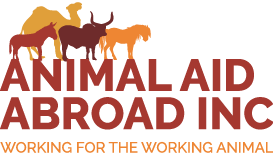Hope for Horses in India
Working equines in India face all manner of serious hazards on a daily basis. From wounds and injuries caused by fencing wire, iron bars or collisions with vehicles to ruptured tendons due to overwork and overloading, the life of a working equine in India is beset with danger, fear and pain. Working horses are also frequently afflicted with a variety of common ailments, such as colic or abscesses. Some of these injured or sick animals will be abandoned due to the owner’s inability to pay for proper veterinary care. Thankfully, our wonderful partner group Friendicoes, who Animal Aid Abroad supports, are dedicated to assisting working equines in New Delhi on a daily basis via their mobile veterinary clinic.
In one instance, they treated a horse suffering from allergic dermatitis, believed to have been caused by unhygienic living conditions and the use of a dirty sack for warmth. The severe skin infection was treated by applying a chlorhexidine solution and orally administering ivermectin. The horse’s skin is healing well and the owner is thrilled by the improvement. See the ‘before and after’ photos below.
Following are a few more examples of cases where Friendicoes have come to the rescue. Animal Aid Abroad supports the work they perform treating equines on the streets of New Delhi and educating owners on how to better care for their animals.
Whilst grazing in a field, this horse became overexcited and was injured by sharp fencing wire. A severe, lacerated wound on the brisket and arm resulted, causing major blood vessel damage and profuse bleeding. The Friendicoes’ team placed the horse under sedation and sutured the wound. Antibiotics, pain killers and a tetanus vaccination were also administered. Rest was advised and the horse is now thankfully much more at ease!
This horse was injured by a sharp iron bar while he was working on the road. He sustained a very deep wound with exposed bone, which was cleaned with antiseptic and dressed by the team. Antibiotics, pain killers and a tetanus vaccine were also given.
The team treated this poor horse suffering from impaction colic. She was frequently lying down and standing up, was unable to defecate and wasn’t eating. Pain killers, fluid therapy and a rectal enema were commenced immediately to alleviate her discomfort.
In this case, a horse was kicked by another animal and developed a painful facial hematoma. Heparin ointment was applied to the affected area and pain killers were administered.
The Friendicoes’ team treated another facial injury, caused by a road accident with a bike. The horse sustained a lacerated wound, which was cleaned with antiseptics and dressed. Additionally, the team administered antibiotics, pain killers and a tetanus vaccine. Due to the location the horse is tied up during the day, she is unfortunately vulnerable to another injury. The paravet is visiting regularly to change the horse’s dressing.
This horse sustained an injury on his hind leg whilst unloading from a truck. Pus and blood were drained away, then the wound was thoroughly cleaned and dressed. A tetanus vaccine and pain killers were provided. The paravet is checking on this horse every day, since he is in a slum area and thus is more vulnerable.
In another case, a horse was in an accident with a vehicle and sustained a wound on her coronet, which then became infected. The team cleaned the wound with antiseptic and dressed it. The horse also had a hoof avulsion (detachment of the hoof from the foot), which is being treated with a hoof supplement.
Friendicoes visited this sweet donkey working in a brick kiln when she sustained a foot injury. She was treated on site by the vet team and is now on her way to recovery.
This horse was treated for an infected abscess on his thigh. The abscess was drained and the wound was debrided and cleaned with antiseptic prior to being dressed. Antibiotics, pain killers and a tetanus vaccine were also administered.
The team treated another horse with an abscess on the thigh area, which presented as fluctuating swelling on the inner thigh. The abscess was incised and drained, then flushed with antiseptic. Antibiotics, pain killers and a tetanus vaccine were additionally given.
Friendicoes received a call regarding a horse abandoned by the roadside in Moradabad who was weak, dehydrated and injured. A truck was hired locally and the horse was rescued with the assistance of a volunteer. He was brought to Friendicoes’ Gurgaon shelter and given a veterinary checkup. The vet confirmed he was suffering from ruptured tendons, potentially caused by overwork or overloading. This horse is now receiving treatment and nourishing food and is hopefully far more comfortable at the sanctuary than he was before.
AAA are delighted with the incredible work Friendicoes are performing every day in their mobile clinic to assist and treat working equines on the streets of New Delhi. No doubt their compassionate and efficient approach is saving many equines from undue suffering and pain.






















